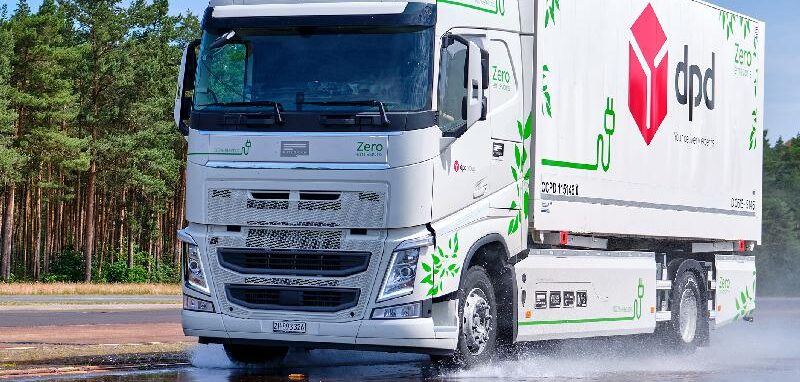In conjunction with vehicle manufacturers and technology partners, Continental says it is working on tire solutions for the latest generation of electrified commercial vehicles. It is currently performing test drives at the Contidrom development facility with an electric truck from Futuricum, which has been in use by DPD Switzerland since March of this year.
The Futuricum vehicle is based on a Volvo FH truck, which has been converted to an electric drive by parent company Designwerk Products. The 19-ton truck has 680hp and a battery capacity of 680kW/h – the largest truck battery in Europe – which allows a range of up to 760km without freight.
“The vehicle has been on the road in Swiss regional traffic since the beginning of the year and is currently rolling on tires of the Continental EcoRegional product line,” said Hinnerk Kaiser, head of tire development bus and truck tires at Continental. “The combination of Conti EcoRegional HS3 and HD3 already enables high mileage and extremely low rolling resistance and thus offers the essential characteristics for the economical operation of electrically powered commercial vehicles.”
According to Continental, the current tests focus on increasing efficiency, and thus range, by reducing rolling resistance. In addition to the original equipment tires on the truck, Conti EfficientPro tires and the brand-new prototypes are being directly compared. The Conti EfficientPro is a proven product that was developed for long-distance transportation and emphasizes fuel efficiency. The prototype tires were produced at Continental’s main R&D center in Hanover-Stöcken using a robot-controlled carving process and refined by tire carvers.
“As with all electric drives, the tires for the Futuricum Logistics 18E are exposed to higher torque during start-off and acceleration,” explained Kaiser. “At the same time, the weight and weight distribution of the tractor are increased by the particularly powerful battery. Therefore, the tires must not only have a low rolling resistance but also withstand heavier loads than tires for comparable vehicles with internal combustion engines. At the same time, they should last just as long and meet the same safety requirements as truck tires for conventional drives.”



